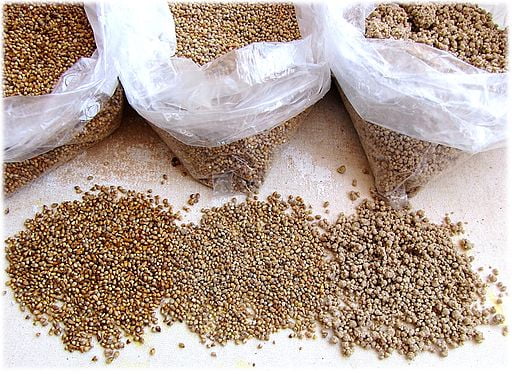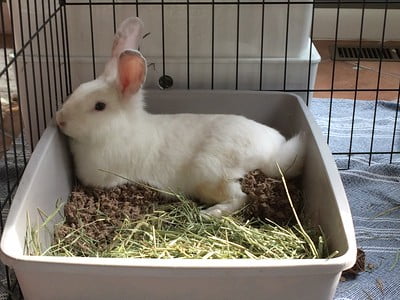Last Updated on March 2, 2023 by Marjon Ramos
Almonds are poison to rabbits and should not be given to them intentionally. Almonds belong to plants that are noted for their cyanide-producing potential.
Almonds contain 25.2 mg of cyanide per kilogram.
According to this study, it would take 22–26 mg of cyanide over an hour for it to be lethal to the majority of rabbits.
So, while almonds can lead to cyanide poisoning, the amount of almonds that your rabbit would need to eat for it to affect its health is a lot.
Also, 100 grams of almonds contains 50 grams of fat, 0.72 grams of starch, and 4.4 grams of sugar.
Rabbits should limit themselves to 0–138 grams of starch per day, meaning rabbits can be fine with or without any starch in their diet.
Rabbits should also limit themselves to 20–50 grams of fat per day.
As you can see, everything about almonds is bad for rabbits.
In addition to potential cyanide poisoning, your rabbits could also suffer from digestive conditions like GI stasis, diarrhea, fatty liver disease, and obesity because rabbits don’t tolerate fatty foods well.
If you notice any changes in your rabbit’s stool, both in size and consistency, or any signs of poisoning, immediately bring your rabbit to a veterinarian.
Now that I’ve given you the gist of the article, read on as I explain in more detail why rabbits can’t eat almonds:
Table of Contents
Risk of overfeeding almonds to rabbits.
Fatty and starchy foods like almonds should not be fed to rabbits intentionally.
They carry certain risks when fed in large amounts because rabbits’ digestive systems are not really designed to digest large amounts of food like almonds.
Here are some of the risks associated with feeding your rabbits large amounts of almonds :
Poisoning
Almonds contain cyanide, feeding your rabbits large amounts of almonds could lead to poisoning.
Here are the most common symptoms of intoxication in rabbits:
- Seizures
- Digestive signs of intestinal inflammation
- Loss of body temperature regulation—high or low
- Lethargy, listlessness
- Loss of appetite
- Depression
If you notice or suspect that your rabbit might be suffering from cyanide poisoning, immediately call your veterinarian or the animal poison control hotline.
Fatty liver disease
Most almonds are high in fat, feeding your rabbits almonds long-term could lead to hepatic lipidosis, or fatty liver disease.
A rabbit’s diet should consist of less than 3% fat, but almonds are high in fat.
Here are the signs that your rabbit might be suffering from fatty liver disease caused by excess fat:
- Loss of appetite (anorexia) – may be sudden or gradual.
- Weight loss
- Decline in number and size of droppings (feces)
- Dehydration
- Depression and lethargy
Diarrhea
Diarrhea in rabbits is often caused by the wrong diet or when the diet is changed too fast.
Feeding your rabbit large amounts of almonds would check those two boxes I mentioned.
Gastrointestinal Stasis
Gastrointestinal stasis is also possible when a rabbit is fed large amounts of almonds, which are high in fat.
GI stasis mainly happens when a rabbit is fed a low-fiber diet.
GI stasis happens when the balance of bacteria in your rabbit’s gut is disrupted.
This disruption would cause painful gas that would eventually lead to organ failure and death if not treated immediately.
The signs of GI stasis are:
If you notice any of these signs, immediately bring your rabbit to a veterinarian.
Uneaten cecotropes
Soft uneaten cecotropes are also possible when rabbits are eating large amounts of almonds instead of hay.
This could lead to softer cecotropes due to the lack of fiber in your rabbit’s diet.
Obesity
Obesity in rabbits is also possible when fed large amounts of starchy food.
Rabbits that are confined in cages all day without exercise and fed large amounts of high-carb, low-fiber diets are the most susceptible to obesity.
Healthy alternative to almonds as treats.
If you are planning on giving your rabbits almonds as treats, these alternatives are much healthier.
Here are some alternatives that you can give to your rabbits one to two times per week as a treat:
- Melon
- Nectarine
- Apple (remove seeds)
- Banana
- Papaya
- Peach
- blueberries
- blackberries
- Pear
- strawberries
- raspberries
- cranberries
- Pineapple
- Plum
- Watermelon
- Cherries (remove seeds)
- Grapes
- Orange
FAQ (Frequently Asked Questions)
Should you panic if your rabbit eats a little bit of almonds?
While it’s true that almonds have cyanide in them, the amount of almonds your rabbit would need to eat to experience any adverse effects is large.
Observe your rabbit for any additional symptoms like seizures, depression, loss of appetite, lethargy, high or low body temperature, and signs of digestive inflammation.
You can also call the poison control hotline if you suspect or are worried that your rabbit is experiencing intoxication.
What to do if your rabbit ate almonds?
Observe your rabbit’s behavior and poop for any changes.
You should also feed them a lot of hay.
The extra fiber would help balance their gut flora.
If you notice any changes in their poop or behavior, consult a veterinarian immediately.
Conclusion
Almonds should never be fed to rabbits intentionally because they contain cyanide.
Almonds are also high in fat and starch, which could lead to digestive problems in large amounts.
While it’s true that almonds contain cyanide, your rabbit would need to eat a lot of almonds before experiencing any adverse effects.
If you suspect or are worried that your rabbit might be suffering from cyanide poisoning, call your veterinarian or your animal poison control hotline.
Cite this article:




